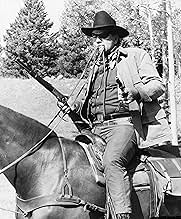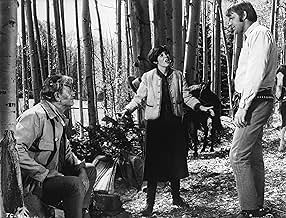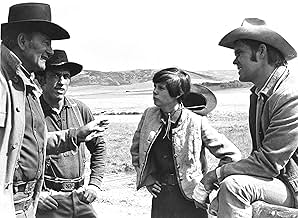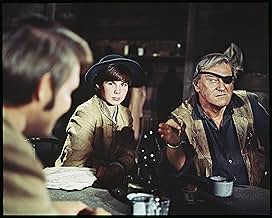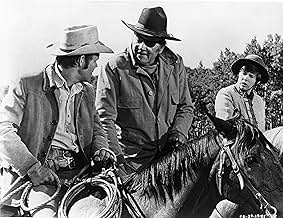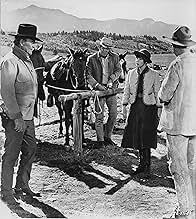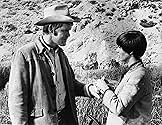Ein abgebrühter und ständig angetrunkener U.S. Marshal und ein Texas Ranger helfen einer dickköpfigen Teenagerin dabei, den Mörder ihres Vaters im indianischen Territorium aufzuspüren.Ein abgebrühter und ständig angetrunkener U.S. Marshal und ein Texas Ranger helfen einer dickköpfigen Teenagerin dabei, den Mörder ihres Vaters im indianischen Territorium aufzuspüren.Ein abgebrühter und ständig angetrunkener U.S. Marshal und ein Texas Ranger helfen einer dickköpfigen Teenagerin dabei, den Mörder ihres Vaters im indianischen Territorium aufzuspüren.
- Regie
- Drehbuch
- Hauptbesetzung
- 1 Oscar gewonnen
- 6 Gewinne & 7 Nominierungen insgesamt
Empfohlene Bewertungen
This is perhaps best remembered today as the film for which John Wayne won his only Oscar. Halliwell's Film Guide rather ungraciously refers to it as a "sentimental Oscar, for daring to look old and fat", but there is more to Wayne's performance than that. The Academy, in fact, had tended to overlook Wayne, just as they overlooked the Western genre which provided him with most of his roles; well over a hundred films had only brought him two previous nominations. Cogburn, however, was one of his best roles. On the surface a hard-bitten, irascible old man, he has hidden depths to his character- not only the courage and determination implied by the phrase "true grit", but also a sense of humour and a capacity for tenderness. Cogburn is a lonely man, divorced from his wife and alienated from his only son, and his only friends are a Chinese storekeeper (a rare acknowledgement from Hollywood that not every inhabitant of the West was either white or an Indian) and his cat. A close relationship, however, grows up between him and the orphaned Mattie, for whom he becomes a substitute father. In turn, she becomes the daughter he never had- or perhaps even a substitute son.
Mattie is a complex character. There is much about her that is androgynous- her tomboy looks, her short hair, even her name, which can be short for Matthew as well as Matilda or Martha. She is brave and determined (there is a suggestion that the phrase "true grit" applies to her as well), but can also be a pain in the neck, especially to Cogburn. She is at times wise in the ways of the world and at others strangely innocent. She is part avenging angel, part bookish intellectual (shown by her rather formal language) and part vulnerable child. It is a role that called for an outstanding performance and got one from Kim Darby who was able to bring out all the various facets of Mattie's character. (This is the only film of hers that I have seen, but it seems strange on the strength of this that her subsequent cinema career has been so patchy). Unfortunately, Glenn Campbell, a singer with little previous acting experience, made a weak La Boeuf. It is probably as well that John Wayne did not get his way when he wanted Karen Carpenter, a singer with absolutely no previous acting experience, to play the role of Mattie instead of Darby. Great actors do not always make great casting directors.
"True Grit" does not perhaps have the depth of meaning of some of the truly great Westerns, such as "High Noon", "Unforgiven" or Wayne's last film, "The Shootist", but it is a very good one. It is a fast-moving and exciting adventure, notable for some beautiful photography of mountainous landscapes (although it is ostensibly set in relatively flat Oklahoma, it was actually filmed in Colorado and California), for one of the great iconic moments of the Western (the scene where Cogburn gallops alone into battle, guns blazing, against four opponents) and for two excellent performances in the two main roles. 7/10
Why this film hasn't had more votes and a higher rating in imdb is a complete mystery to me. I'm English, and I always thought the Americans really loved their westerns and John Wayne in particular. Can anyone explain please?
In movies, the desire to please as wide an audience as possible seems always to win out, effectively robbing most westerns of the motion picture's essential gambit; the suspension of disbelief. It's very hard to lose oneself in a tale of the late 1800's when the female lead's eye-liner and coiff are pure 1950. Or 1940, 1960, whatever. In True Grit, very little of 1969 is allowed to intrude on this rather simple tale of justice and revenge. This movie is anchored by two very strong themes, shared by all the actors, across most of the scenes.
The first, is language. The dialogue is an absolute delight. Crack open anything by Mark Twain, Henry James or any other late 19th century author, and you will see that people really did speak differently 150 years ago. That the dialogue in 99% of westerns is straight from the time of their filming is a travesty, at best.
Second, is innocence. Not that of any one character however, but the innocence of the human race as a whole. It is probably almost impossible for any of us now, in this day and age, to truly imagine what it must have been like to live back when. But one thing's sure, people were much more naive. There was no such thing as mass-communication, a good percentage of the population didn't read, and newspapers, the only "organized" form of news at the time, were hard pressed to report on anything more than a day's ride from town.
This basic, shared innocence is achingly portrayed by Robert Duvall in two short sentences near the end of the movie when he's caught Mattie and he's attempting to threaten her. Study those two lines, and you'll see that "Lucky" Ned Pepper, the worst villain in the story, really has no idea of what he could possibly do to a slip of a girl. He's totally at a loss. The unspeakable, modern-day atrocities we consume every day with our coffee and bagels are so far from contemplation by Duvall's character, that all he can do is assure her, "I'll do what I have to". It's a priceless moment - frighteningly accurate commentary wrapped in two lines of simple dialogue, delivered with dead-on interpretation.
The only other western I can think of at the moment that delivers with such viscerally historic accuracy is "Unforgiven".
MjM
However, the film does look great. Handsomely shot with great scenery, True Grit is pleasing to the eye. Elmer Bernstein's score is rousing and very fitting, while the story is interesting, most of the characters are credible and the script flows well. Also True Grit is very well directed, and there is a glorious final shoot-out. Other than Campbell and Darby, the other acting is fine. While I would have not personally given the Oscar to this particular performance(I thought he was better in The Searchers, Red River and The Quiet Man) John Wayne is excellent here, and while he doesn't appear until quite later on Robert Duvall also makes a positive impression.
All in all, a very good film but could have been better in my view. 7/10 Bethany Cox
Wusstest du schon
- WissenswertesStunt double Jim Burk performed the entire scene where Rooster Cogburn charged Ned Pepper's gang on horseback. John Wayne was only seen briefly in close-up, and he was riding on a trailer, not a horse.
- PatzerRooster reports Lucky Ned Pepper had robbed the KATY Flyer, a train that did not start running until 1896, long after the time in which the story is set.
- Zitate
[Rooster confronts the four outlaws across the field]
Ned Pepper: What's your intention? Do you think one on four is a dogfall?
Rooster Cogburn: I mean to kill you in one minute, Ned. Or see you hanged in Fort Smith at Judge Parker's convenience. Which'll it be?
Ned Pepper: I call that bold talk for a one-eyed fat man.
Rooster Cogburn: Fill your hand, you son of a bitch!
- Alternative VersionenWhen submitted for a rating from the MPAA in 1969, the film was given an "M". The film was edited and rerated "G". The American VHS version contains the "G" rated cut while the DVD is the uncut "M" version (which would be printed as "PG" since the symbol was changed in the 1970s).
- VerbindungenEdited into The Kid Stays in the Picture (2002)
Top-Auswahl
- How long is True Grit?Powered by Alexa
Details
- Erscheinungsdatum
- Herkunftsland
- Offizieller Standort
- Sprache
- Auch bekannt als
- True Grit - Der Marshal (2011)
- Drehorte
- Produktionsfirma
- Weitere beteiligte Unternehmen bei IMDbPro anzeigen
Box Office
- Bruttoertrag in den USA und Kanada
- 276.418 $
- Eröffnungswochenende in den USA und in Kanada
- 157.788 $
- 5. Mai 2019
- Weltweiter Bruttoertrag
- 276.418 $
Zu dieser Seite beitragen



